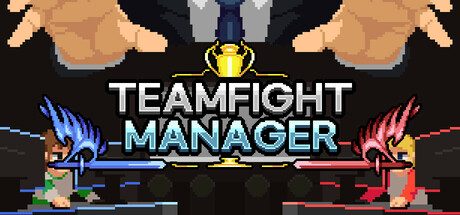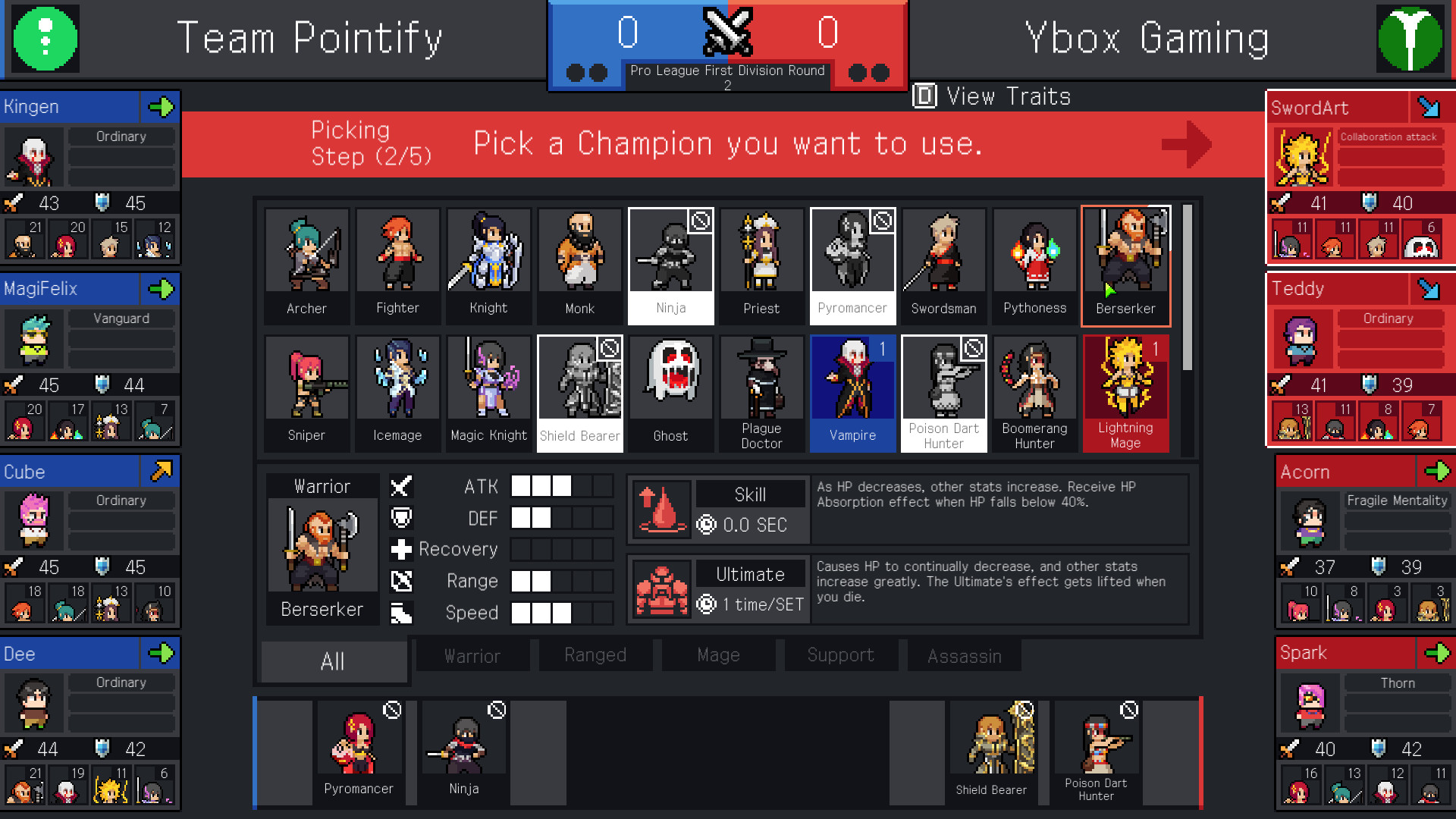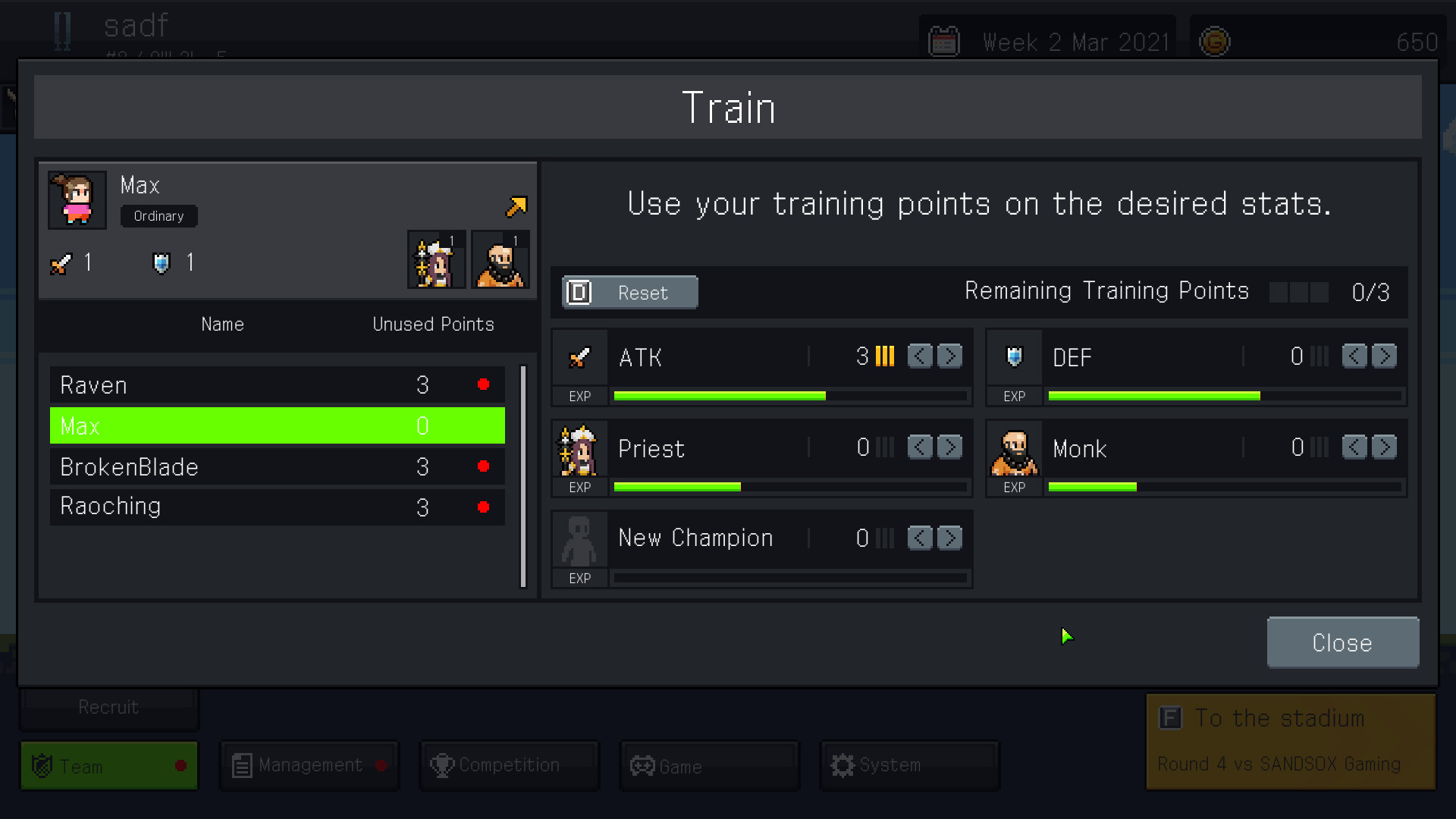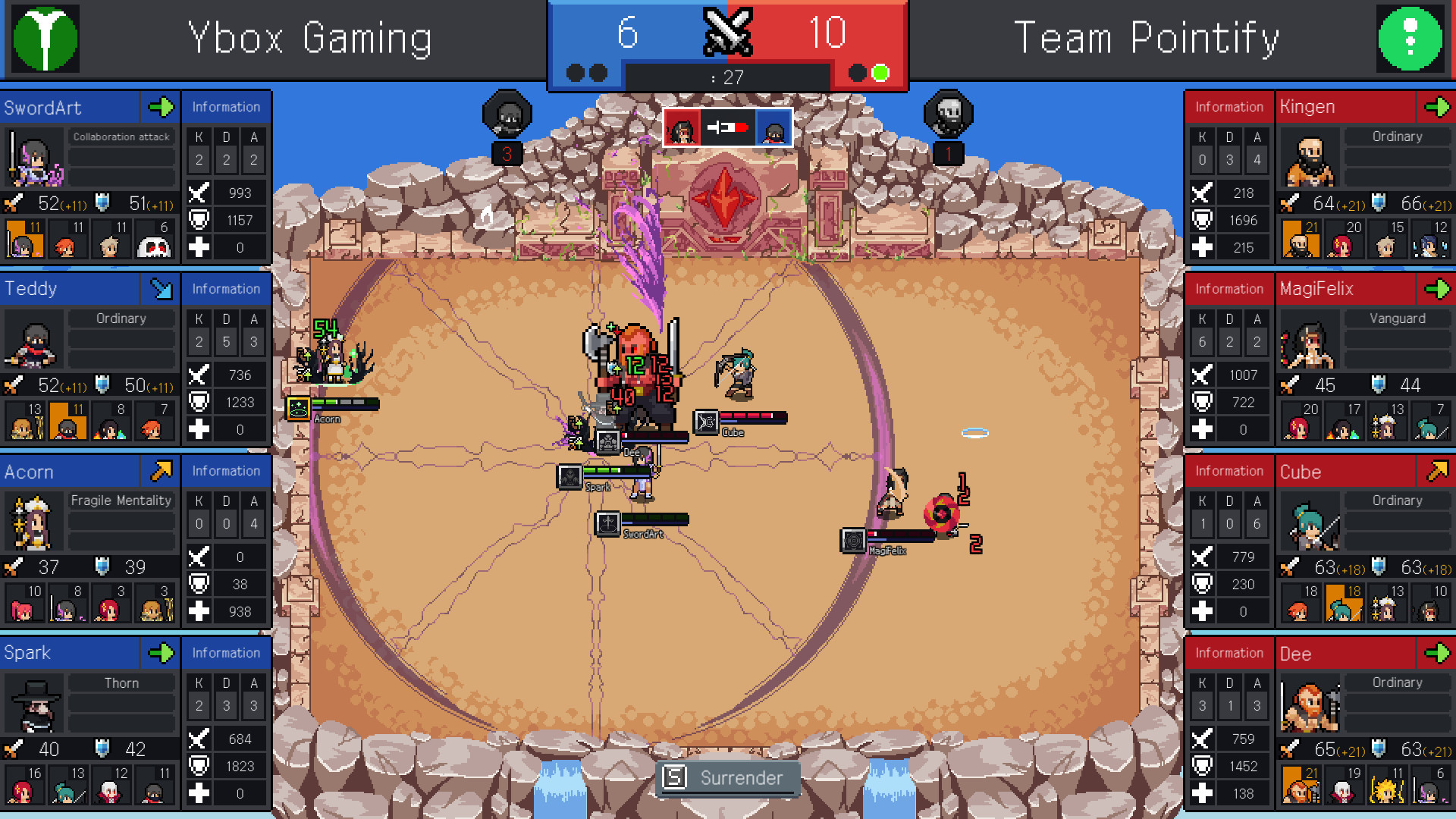I will preface this review by voicing my bias – I am the target audience for Teamfight Manager. I am a big fan of both of the genres on show here. I loved Game Dev Tycoon, and games similar to it, which I believe Teamfight Manager is quite similar to in both presentation and game play. And I love the MOBA genre.
I have thousands of hours on Dota 2, and thousands more on Heroes of the Storm. As such, my impression of the game might be drastically different to yours if you’re neither a fan of the MOBA genre, or simulations games like this. However, if you’re looking to try something different and expand your horizons, or you a fan of either genre, well then join me for MGN’s Impressions of Teamfight Manager.
So, what is Teamfight Manager? Well, as the name suggests the player takes control of a MOBA e-sports team in the hope of pulling the team from the lowest possible ladder position and league, in the hope of coaching the players and managing the team all the way to being the best in the world.

The game begins with some exposition about you, the player, and what life you’ve led leading up to the point where you take control of the new team. You’ve been a successful Teamfight player, then retired from play and became a successful Teamfight coach. Now, with few challenges left you’ve decided to try and take an inexperienced and unskilled Teamfight E-Sports Team, and make them world champions.That’s the goal. Is that journey entertaining? Is it told well? Is the game-play surrounding that goal any good? Well, that’s what we’re going to get into.
As usual our MGN Impressions are broken down into four separate but equal parts:
Story:
Sometimes simulation games like this have a only a skeleton of a story. They provided context for your activities and let the game-play carry the rest. This can be disappointing for players that not only want to live out the life of simulated counterpart, but also want a rich story that provides more than just a purpose for clicking buttons.
Does Teamfight manager fall into this crutch? If it does, is the context provided in the early exposition enough to carry the players interest all the way through their play-through? If there is a story, is it told well? Is there intrigue there, or is it phoned it?

We’ve already gone over the early exposition of the game, the one that gives you your initial purpose and helps you maintain interest from buying to play. But, is that maintained through the game, or is it left simple and alone? Well, we’ll get there.
Sound:
Sound is broken up into a few points. The first is voice acting. Is there any? If there is, how is it? Was the game casted well, and do the voice actors put on a good performance? If there isn’t, why not? Would the game benefited from some quality voice acting and does the game feel dead without it?
The next is sound effects. We’ll go over whether the sound effects for the game hit the ear well. Are they too repetitive, do they genuinely sound like the actions that they’re supposed to? Or do the feel like someone in their basement recorded a piece of tin-foil in a dishwasher.
The third element of sound is the soundtrack. A good soundtrack can make or break a game. So, where does Teamfight Manager stand in terms of soundtrack. Is it good enough that you’ll want to play it in the background whilst studying or working? Is it so bad that you mute the game every single time you start it up, just so that you won’t have to endure it? Or does Teamfight Manager sit somewhere in the middle – we’ll go over that too.
Gameplay:
How does the game feel to play? Are game-play mechanics introduced in a natural and easy to understand way? Then we’re going to go over every facet of the gameplay that can be found in Teamfight Manger – let you know the good points, the bad points, what’s done well, what’s missing or done poorly.
Similar simulations games are sometimes lacking in the depth of gameplay, or the understanding how to turn a job like coaching or developing into something that is actually fun to do recreationally. Yes, the need or want from an audience to simulate the life an E-Sports coach might be there, but that doesn’t mean the studio developing the game knows how to make that life actually fun and enjoyable. So, does this game hit the mark?
Is it deep, is it simple? If the level of game-play is deep, is that a good thing, does that add purpose and enjoyment – or is the game simply complex for the sake of being complex? If it isn’t deep, and what you see on the surface is the entirety of the game-play, is there enough there to make it worth you time and money? We’ll get there.
X-Factor – Longevity:
The X-Factor for our MGN Impressions will change from game to game, and review to review. For Teamfight Manager we’ve decided to go with Longevity. These types of games often fall in the crux of: ‘bought on sale, played it for a few hours, liked it but never touched it again’. So, does Teamfight Manager have enough content to ensure that is has some staying power.

If it does have enough content, is it quality? And does that quality transition to the game being worth in hours of playtime, to how much money that you’ve spent on it. Teamfight Manager isn’t overly expensive, but are we getting what we paid for? Are we getting more? Less? We’ll see.
5:44 Story – 3 /10
I will say that something immediately noticeable about the game is that the story seems to actively contradict the game-play. When we’re given the exposition dump at the beginning of the game to give some pretext to our game-play, we’re told that the player, that is you and I, were a very successful Teamfight player, and after a long and successful career we’ve decided to take up coaching. Then, after a long and successful coaching career, we’ve decided to start again from the bottom.
My issue with this is that it implies that Teamfight has been around for a very long time, but the more you play the game the more you realize that they’ve only just started to add more heroes and balance patch the game since you’ve started your new coaching job. The game exists for several years, but only gets updates when you begin your career again? Look I know you don’t REALLY play these kind of games for a rich story-telling experience, but come on.
I don’t really mind the introduction to ‘why you’re playing the game’, but I feel like it is mishandled. You’re told you never lost a world series, and never lost a world series as a coach either. It just feels .. unnecessary?
It feels a bit over the top to have the player be the best ever at everything. You could just be a coach starting out, with the game just becoming popular in the mainstream E-Sport scene. It’d make the game and the introduction cut-scene make a lot more sense. You’re new, the game is new – of course you have start at the bottom. Of course there hasn’t been any new heroes or major patches yet. But, instead, we get the over the top version.
That issue aside, as least the studio has tried to add a story to the game-play. Add some life and character to a simulation game, and they do get points for trying. But, like I said it just feels mismanaged and a bit over the top – for a point I can’t really see.
7:55 Sound – 6/10
The sound effects are actually really intelligently done. You will need to become quickly familiar with what hero ability corresponds to what sound affect. It doesn’t have a great impact on the game-play, but to fully enjoy the spectacle of watching the fights unfold, it helps a lot. And it’s done really well.

The first example that comes to mind is the Swordmaster. His ultimate ability is really impactful, and can turn the tide of fights. As such, you’d like not to miss the spectacle but sometimes fights are so hectic that you cannot help but get lost in all the action. That is where the instantly recognizable and well executed sound effect of his ultimate ability comes in. You can tell what is happening, even with the visual clutter that happens in MOBA games, by the sound effects, and that makes watching fights unfold so much better. So kudos to the team for having the nous to know that’s necessary and to pull it off.
There is no voice acting, and the game doesn’t really suffer for it to be honest. You kinda expect that in these text scrolling type of games. It’s got a pixelated bit-like art-style and sound-style, and as such I don’t really have a problem with having to read the text as opposed to having it read to me. It doesn’t feel out of place, the lack of voice acting, so I won’t really deduct points for that.
What I’m not really a huge fan of, and what has deducted from the score, is the soundtrack. It is absolutely possible to pull off a retro-techno gameboy style soundtrack that is easy to listen to and actually worth turning up the sound for. Teamfight Manager doesn’t have it. It’s not particularly inspired, and it’s very, very repetitive. Honestly, it’s more annoying than anything and I cannot fault you for turning off the music and just trying to listen for sound-queues in fights for the spectacle. You’re not missing much with the soundtrack.
9:56 Gameplay – 9/10
Teamfight Manager is addictive, it’s fun, and it’s really, really deep. Your initial impression might be that there isn’t much there, but the longer you play the more of the complexity unfolds. This is done not to overwhelm the player as mechanics and points are introduced, but to let you wrap your head around a situation before the next unfolds, and that is a good decision from the developer.
I say the game is deep, but what does that mean? Well, you start off with a simple household of a few gamers, and the Teamfights that unfold are also quite simple in a 2v2 format with only a few heroes to select from. Then, as the game unfolds you’ll be in charge of bringing on new talent to your team, upgrading the household, upgrading the team’s equipment. You need to ensure that the players you have are maining heroes that are relevant in the meta. You need to ensure that you have players who can play the new heroes as they’re released. You need to adapt to the 3v3 and later 4v4 format. You’re managing a roster of talent across multiple teams. You’re ensuring that you have the funding for all this. There’s just a lot there.
The paradigm that you’re playing to is always changing, and there in lies both the challenge of the game and the joy. Say you’ve invested heavily in bringing in a new gamer for your team, because they play the new hero really well. But then you bring that into the season and suddenly the new hero isn’t terribly meta – you’re going to have a rough season. On the inverse of that, you’ve predicted which hero is going to play well and invested in both your team that way, and training toward that meta. That can be super rewarding as the season unfolds. That’s where the majority of fun is to be had in Teamfight Manager.

Planning well, and adapting well is heavily rewarded. And not planning well, and not adapting is punished enough to make the game a challenge. This makes the game very addictive. You’ll want to get it right every time, and the only way to find out whether you pulled it off it to play more and more. The buffs and nerfs to heroes, the addition of new heroes, new game-play mechanics as you progress – they all aid to make the game both deep, and constantly fresh.
The game can also create stories and funny moments all of it’s own accord through those new gameplay mechanics I mentioned too – such as streaming. Whilst playing through Teamfight Manager my most popular player was Cornish. And as he was the most popular, I made him stream constantly to bring in the cash. He complained about the burn-out of playing during the season, and having to stream constantly on top of that. I listened to his complaint, and made Cornish stream the next day too. How much fun you have in this game can be entirely up to you at times, and those opportunities are just another reason gameplay has scored so highly.
My single complaint with the gameplay is that it feels like stats of your players are largely irrelevant. You can gain stats by having your players play with heroes that they’re familiar with, and through other factors like their traits, and training. But when it comes down to the battles, these don’t feel impactful whatsoever. It doesn’t feel like stats have any impact on the outcome of fights, like the draft and meta do. So, that needs a lot of tweaking from the developer because it certainly doesn’t feel like it’s working at all right now.
13:19 X-Factor: Longevity – 8/10
You might have guessed that since I have praised the game for constantly changing and evolving with the playtime, that it would score well with Longevity. Well, kudos to you because you’re absolutely right, I have. And that’s exactly the reason that the game has staying power.

I have currently around thirty hours played on Teamfight Manager, and I wanted to experience the full game before I wrote the review and I feel like I have. However, that doesn’t mean that my time with the game is over. Yes, I’ve unlocked all the heroes, taken a team to the world cup, and obtained the equipment there is to obtain. But doing all this in a single playthrough isn’t the end of the game. There’s the genius New Game + feature.
With this you can do it all over again, but dictate the terms in which the Teamfight game is played. You can start out with 3v3 battles if you wish. You can set how often the patches are, you can set how drastic the changes these patches include are. You can change which heroes are available when Teamfight releases, how many are available, and how quickly new ones are introduced.
This gives the game even more Longevity, on top of the constantly evolving nature of the base game. Yes the game will change as you play it, and will keep your first playthrough fresh, but once you’ve completed that first playthough, what is the point of playing Teamfight Manager again? Well, this is it, New Game +. You dictate the terms of your play-through to get even more hours from the game, and for that it earns an 8.
Closing
That’s going to wrap things up for our review of Teamfight Manager. We’re constantly posting new content on our MGN.gg blog, and our Youtube channel MGN TV. If you want all the best gaming news, reviews, guides and more on all your favorite games, then make sure you’re following us on both platforms and thank you for checking out our review of Teamfight Manager.
Next:
Dreamscaper – Full Release – Review (PC Version)
Credits
| Program | Founding Writers |
| Author | Luke Cowling |
| YouTuber | Luke Cowling |
| Publisher | MGN |
| Game | Teamfight Manager |
This is a great and honest review. Most reviews out there often feel ‘too formal’ but not this one, it feel honest.
I was thinking if I should buy but after several reviews I still not sure because if don’t feel honest, but I will now after reading your review.
Thank you.